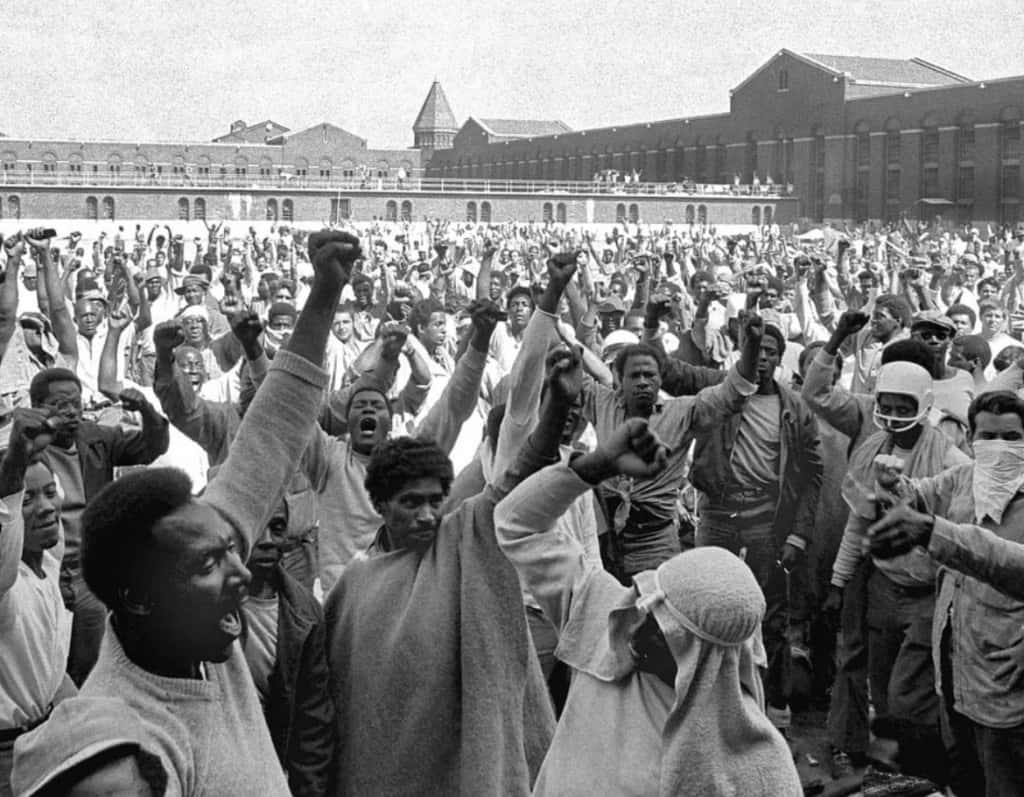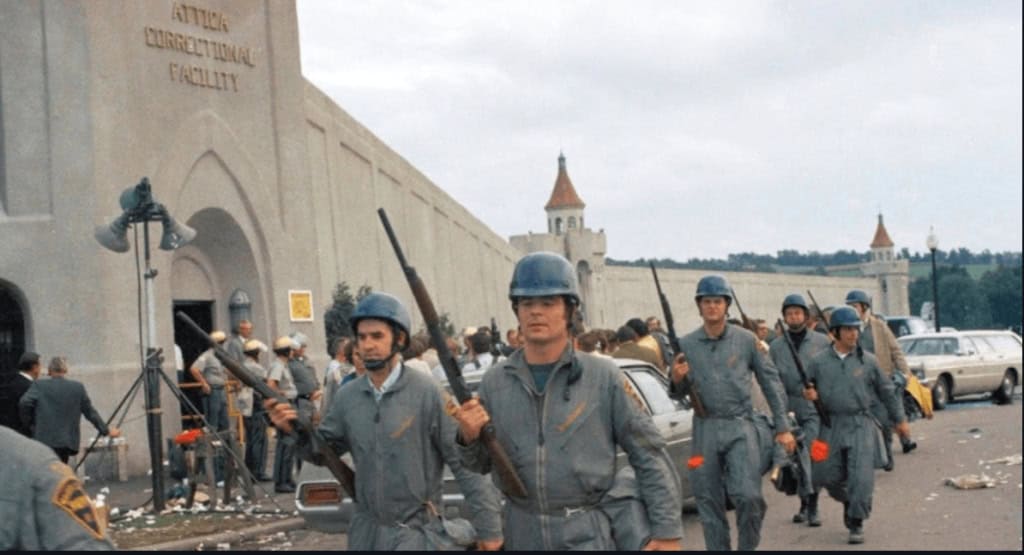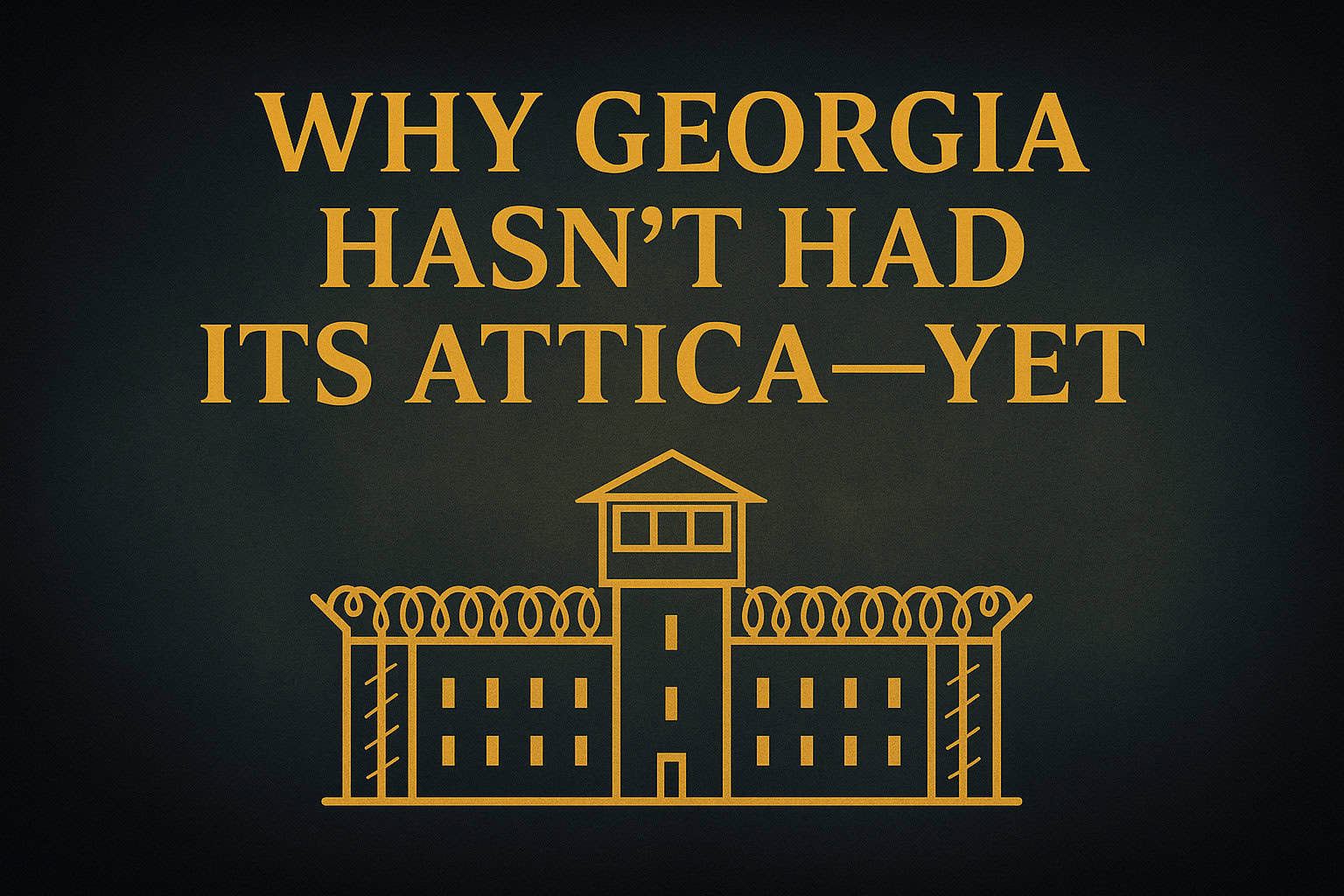When Injustice Sparks Rebellion
History shows that when confined people are denied humanity and avenues for redress, rebellion becomes inevitable. From mutinies aboard 18th-century naval ships—when starving sailors rose against abusive captains—to 20th-century prison uprisings, collective resistance has always been a last resort for the oppressed.
The most infamous of these rebellions came in September 1971, when over 1,200 men at New York’s Attica Correctional Facility took control of the prison to demand basic human rights. Their uprising was sparked by years of abuse, racism, medical neglect, and being treated as subhuman. Their demands were clear: dignity, safety, rehabilitation, and justice. The state responded with gunfire.

Despite enduring similarly brutal and unconstitutional conditions, incarcerated people in Georgia have not launched a full-scale uprising like Attica. This article explores why.
Attica Then, Georgia Now
Attica 1971:
- Attica prisoners lived in overcrowded cells, limited to one shower per week and one roll of toilet paper per month.
- Black and Latino prisoners were routinely abused by white officers.
- Medical care was inadequate or nonexistent.
- No fair grievance process existed.
- After years of unanswered petitions, prisoners revolted. The state killed 39 people—29 inmates and 10 hostages—in a brutal retaking of the prison 1.

Georgia Today:
- GDC prisons are plagued by understaffing, corruption, medical neglect, and deadly violence.
- Gangs control many dorms. Over 100 homicides occurred behind bars in 2023 alone 2.
- Inmates often go weeks without showers or months without medical care. Some die in their cells and aren’t discovered for days.
- A 2024 DOJ report found Georgia in violation of the Eighth Amendment for failing to protect incarcerated people from rampant violence and depriving them of humane living conditions 3.
By nearly every metric, the conditions that led to the Attica riot exist—and in some ways are worse—in Georgia today.
Why Hasn’t Georgia Exploded?
1. Fear of Brutal Reprisal
The 2020 riot at Ware State Prison offers a chilling example. After prisoners took control of parts of the facility, the state cut off power during a brutal Georgia summer. Without fans or A/C, prisoners sweltered in their cells for weeks. They were fed peanut butter sandwiches for long stretches and denied basic sanitation. Many were locked down for months. The message was clear: rise up, and we will punish you into the ground 4.
Georgia law also allows the state to add up to 20 years for participating in a “riot in a penal institution,” and prosecutors have a broad interpretation of what constitutes one 5.
2. Gang Fragmentation and Rivalries
In Attica, prisoners united across racial lines to present demands. In Georgia, prisons are deeply fractured. Rival gangs—Bloods, GDs, Aryan Brotherhood, others—control dorms and often engage in internal wars. GDC policy appears to exploit this, keeping rival gangs housed together to direct violence inward, not upward. This prevents unity. Divided populations rarely rebel in one voice.
3. Psychological Suppression and Apathy
Hopelessness is one of the state’s most effective weapons. Georgia prisoners are trapped in a system where grievances go unanswered, violence is normalized, and survival is the only goal. Many incarcerated people no longer believe that reform is possible. Despair breeds compliance.
4. Cell Phones as a Pressure Valve
Contraband cell phones are widespread in Georgia prisons. But instead of fueling crime, they often serve as lifelines: prisoners use them to call families, seek help, expose abuse, and maintain a connection to humanity.
While officials have blamed cell phones for violence, no credible evidence supports this. The only verified contract killing involving phones occurred under the RICO case against Warden Brian Adams and corrupt staff—not inmates 6.
The real threat is transparency. That’s why GDC is currently rolling out a Managed Access System (MAS) to block cell phone signals inside all Georgia prisons—a move that could sever prisoners from the outside world entirely.
Learn more about this crackdown here: GPS, Georgia’s Cell Phone Crackdown: Security or Silence?, https://gps.press/georgias-cell-phone-crackdown-security-or-silence/
5. The Calm Before the Storm
Georgia hasn’t had its Attica—yet. But the ingredients are here: despair, violence, deprivation, and silence. The absence of rebellion isn’t peace. It’s pressure building. And if these conditions persist, the explosion may come.
What Must Be Done
- Address understaffing and end gang control.
- Restore dignity: real food, access to healthcare, education, and basic hygiene.
- Protect the right to communicate.
- Stop treating human lives as disposable.
Call to Action:
Use Impact Justice AI (https://ImpactJustice.AI) to email lawmakers, media, and oversight agencies. Tell them: this system must change before it explodes. Prisoners are people. What Georgia does in the dark will not stay hidden forever.
Write your legislators. Find your state legislators here: https://openstates.org/find_your_legislator/
Share this article. Demand answers.
Attica was a warning. Georgia has ignored it for too long.
Further Reading:
- GPS, Lethal Negligence: The Hidden Death Toll in Georgia’s Prisons, https://gps.press/lethal-negligence-the-hidden-death-toll-in-georgias-prisons/
- GPS, Georgia’s Cell Phone Crackdown: Security or Silence?, https://gps.press/georgias-cell-phone-crackdown-security-or-silence/
- GPS, From Kangaroo Courts to Chaos: Georgia’s Prison Crisis, https://gps.press/from-kangaroo-courts-to-chaos-georgias-prison-crisis/
- GPS, How Georgia Prisons Habitually Cover Up Murders, https://gps.press/how-georgia-prisons-habitually-cover-up-murders/
- GPS, A Simple Message for the GDC, https://gps.press/a-simple-message-for-the-gdc/


Additional Sources we used for this article:
- Heather Ann Thompson – Blood in the Water: The Attica Prison Uprising of 1971 and Its Legacy
Publication: Pantheon Books / Vintage Books
URL: https://www.penguinrandomhouse.com/books/555308/blood-in-the-water-by-heather-ann-thompson/ - U.S. Department of Justice – 2024 Findings Report on Georgia Prisons
URL: https://www.justice.gov/d9/2024-09/findings_report_-_investigation_of_georgia_prisons.pdf - The Georgia Virtue – “Judge Sanctions Georgia Department of Corrections for Noncompliance with Discovery”
URL: https://www.thegeorgiavirtue.com/local-news/savannah/judge-sanctions-georgia-department-of-corrections-for-noncompliance-with-discovery/ - Atlanta Journal-Constitution – Coverage of Georgia prison staffing, deaths, and Ware riot
URL: https://www.ajc.com (search terms: “Georgia prisons,” “Ware State Prison riot,” “GDC homicides,” etc.) - Georgia Department of Corrections Staffing Reports and Facility Assessments (2021–2024)
Source: GDC Public Disclosures (PowerDMS or Open Records Requests) - Georgia Code § 16-10-56 – Riot in a Penal Institution
URL: https://law.justia.com/codes/georgia/2022/title-16/chapter-10/article-3/section-16-10-56/ - Georgia Senate Public Safety Committee Hearings (2022)
Topics: Testimony on GDC violence, staff shortages, and gang control
URL: https://www.legis.ga.gov - Marshall Project – Coverage of prison conditions, grievance systems, and solitary confinement
URL: https://www.themarshallproject.org - Equal Justice Initiative – Historical analysis of prison uprisings and carceral conditions
URL: https://eji.org - Prison Policy Initiative – Reports on prison overcrowding, recidivism, and labor
URL: https://www.prisonpolicy.org - The New York Times – Archive reporting on Attica (1971–1972)
URL: https://www.nytimes.com - NPR – “What Happened at Attica Prison in 1971?” (50th anniversary reflection)
URL: https://www.npr.org/2021/09/09/1035600912/attica-prison-uprising-1971 - The Brennan Center – Analysis of solitary confinement and prison reform
URL: https://www.brennancenter.org - Southern Center for Human Rights – Georgia prison abuse litigation
URL: https://www.schr.org - Books & academic studies on correctional policy (1970s–present)
- The Rise and Fall of the American Prison System, Locked In, etc.
- Georgia Bureau of Investigation (GBI) – Public disclosures on RICO cases (e.g., Brian Adams)
URL: https://gbi.georgia.gov - U.S. Bureau of Justice Statistics – Historical data on incarceration and prison uprisings
URL: https://bjs.ojp.gov
Footnotes
- Thompson, “Blood in the Water”, https://www.penguinrandomhouse.com/books/555308/blood-in-the-water-by-heather-ann-thompson/[↩]
- GPS, https://gps.press/how-georgia-prisons-habitually-cover-up-murders/[↩]
- DOJ Findings, https://www.justice.gov/d9/2024-09/findings_report_-_investigation_of_georgia_prisons.pdf[↩]
- Atlanta Journal-Constitution, Ware Riot Coverage, https://www.ajc.com/[↩]
- O.C.G.A. §16-10-56[↩]
- The Georgia Virtue, https://www.thegeorgiavirtue.com/local-news/savannah/judge-sanctions-georgia-department-of-corrections-for-noncompliance-with-discovery/[↩]
